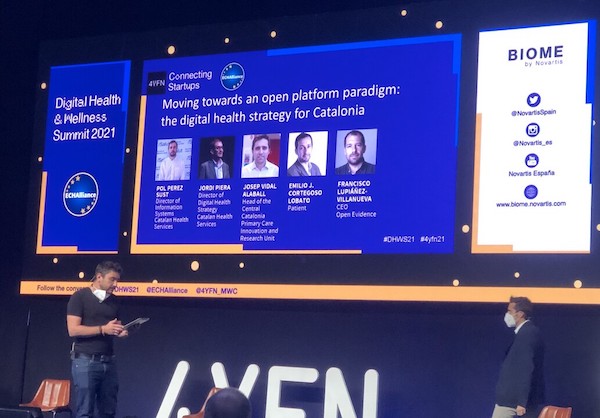semantic interoperability
See the following -
An Epic Conflict of Interest
Meet Judy Faulkner. She is the founder and CEO of Epic Systems Corporation in Wisconsin. She is also a member of the GAO Health Information Technology Policy Committee and an advisory board member of the Journal of Healthcare Information Management. She is also politically active. Read More »
- Login to post comments
An Epic conflict of interest
Meet Judy Faulkner. She is the founder and CEO of Epic Systems Corporation in Wisconsin. She is also a member of the GAO Health Information Technology Policy Committee and an advisory board member of the Journal of Healthcare Information Management. She is also politically active...The $787 billion stimulus bill signed into law by President Obama in February 2009 included $19 billion for healthcare information technology (HIT), and created the Health IT Policy Committee, whose job it was to advise the federal government on spending the $19 billion allocation. The committee was to have one member responsible for representing information technology vendors. Judy Faulkner was designated as that member.
- Login to post comments
An Epic Conflict of Interest: Part 2
So we are left to wonder whether patient care and best practices are being sacrificed on the altar of favoritism, cronyism and special deals. If it matters to you what kind of care patients are receiving and how HIT systems contribute to the quality of patient care, then Faulkner’s willingness to prioritize political back-scratching above quality HIT practices ought to raise alarms.
- Login to post comments
Catalonia releases RFI on technology elements to build an open platform using openEHR ~ ECHAlliance
 The region of Catalonia has launched today a Request for Information (RFI) with the purpose to obtain technical information on the possibilities of supplying the elements of a technological platform for the development of the Electronic Health Record of Catalonia. Given the technical complexity of the technological platform for the development of the Electronic Health Record and the need to finish defining its design and the components of the platform to be tendered, as well as to inform the economic operators active in the market of the need that has arisen...
The region of Catalonia has launched today a Request for Information (RFI) with the purpose to obtain technical information on the possibilities of supplying the elements of a technological platform for the development of the Electronic Health Record of Catalonia. Given the technical complexity of the technological platform for the development of the Electronic Health Record and the need to finish defining its design and the components of the platform to be tendered, as well as to inform the economic operators active in the market of the need that has arisen...
- Login to post comments
European Commission Launches Interoperable Europe, The New Policy Framework For Interoperability In The European Union
 On November 21st, the European Commission announced the launch of Interoperable Europe, the initiative for a reinforced interoperability policy in the EU that replaces the ISA2 Program and is funded by the new Digital Europe Programme, a new funding program focused on digitalization for businesses, citizens and public administrations.Interoperable Europe represents the policy framework for pursuing, supporting, developing and promoting interoperability across the European Union. On the financial side, it is funded by the part of the Digital Europe Program dedicated to interoperability.
On November 21st, the European Commission announced the launch of Interoperable Europe, the initiative for a reinforced interoperability policy in the EU that replaces the ISA2 Program and is funded by the new Digital Europe Programme, a new funding program focused on digitalization for businesses, citizens and public administrations.Interoperable Europe represents the policy framework for pursuing, supporting, developing and promoting interoperability across the European Union. On the financial side, it is funded by the part of the Digital Europe Program dedicated to interoperability.
- Login to post comments
Halamka's Report on The April 2015 HIT Standards Committee Meeting
 The April 2015 HITSC meeting focused on the Certification Rule NPRM and a comprehensive review of the Federal Interoperability Roadmap. I suggested that a guiding principle for the committee’s work is to emphasize the enablers in the proposals while reducing those aspects that create substantial burden/slow innovation. As a federal advisory committee our job is to temper regulatory ambition with operational reality.
The April 2015 HITSC meeting focused on the Certification Rule NPRM and a comprehensive review of the Federal Interoperability Roadmap. I suggested that a guiding principle for the committee’s work is to emphasize the enablers in the proposals while reducing those aspects that create substantial burden/slow innovation. As a federal advisory committee our job is to temper regulatory ambition with operational reality.
- Login to post comments
Health Information Exchange Resist Cures (Part 2)
 The previous section of this paper introduced problems found in HIE by two reports: one from the Office of the National Coordinator and another from experts at the Oregon Health & Science University. Tracing the causes of these problems is necessarily somewhat speculative, but the research helps to confirm impressions I have built up over the years. The ONC noted that developing HIE is very resource intensive, and not yet sustainable. (p. 6) I attribute these problems to the persistence of the old-fashioned, heavyweight model of bureaucratic, geographically limited organizations hooking together clinicians. (If you go to another state, better carry your medical records with you.) Evidence of their continued drag on the field appeared in the report...
The previous section of this paper introduced problems found in HIE by two reports: one from the Office of the National Coordinator and another from experts at the Oregon Health & Science University. Tracing the causes of these problems is necessarily somewhat speculative, but the research helps to confirm impressions I have built up over the years. The ONC noted that developing HIE is very resource intensive, and not yet sustainable. (p. 6) I attribute these problems to the persistence of the old-fashioned, heavyweight model of bureaucratic, geographically limited organizations hooking together clinicians. (If you go to another state, better carry your medical records with you.) Evidence of their continued drag on the field appeared in the report...
- Login to post comments
Health IT interoperability by example
 The health IT interoperability area is so confused now that we really need to look to some very practical examples of where interoperability has been solved, at least at an entry-level, and stop some of the hand-wringing, angst, and casting about. The federal government moving into the next administration and the post – Meaningful Use era, particularly needs to focus its attention and programs to develop "entry-level" interoperability to justify the public's 30 billion dollar EHR investment and make EHR data serve broader health outcomes for patients and populations...
The health IT interoperability area is so confused now that we really need to look to some very practical examples of where interoperability has been solved, at least at an entry-level, and stop some of the hand-wringing, angst, and casting about. The federal government moving into the next administration and the post – Meaningful Use era, particularly needs to focus its attention and programs to develop "entry-level" interoperability to justify the public's 30 billion dollar EHR investment and make EHR data serve broader health outcomes for patients and populations...
- Login to post comments
Multiple New Reports on Interoperability Released
 Two new reports on interoperability, and a related Call to Action were released in fall 2017 with potential impact on public health. The reports focus on the perceived successes and barriers to health information exchange and interoperability. We draw out the relevance of these reports to public health as well as some of our own observations on these issues from a past working paper. The Call to Action released by the Health Information Management and Systems Society (HIMSS) calls on the Department of Health and Human Services (HHS) to demonstrate leadership and promote progress in a number of key areas.
Two new reports on interoperability, and a related Call to Action were released in fall 2017 with potential impact on public health. The reports focus on the perceived successes and barriers to health information exchange and interoperability. We draw out the relevance of these reports to public health as well as some of our own observations on these issues from a past working paper. The Call to Action released by the Health Information Management and Systems Society (HIMSS) calls on the Department of Health and Human Services (HHS) to demonstrate leadership and promote progress in a number of key areas.
- Login to post comments
RWJF Report: Time to Transition to a Post-HITECH World?
 Context and perspective matter. And it’s often both context and perspective that are lacking from the daily snapshots we get of health information technology, meaningful use, interoperability and the progress we are either making or not making, depending on your perspective. So I welcome a report like the one the Robert Wood Johnson Foundation (RWJF) released last month on the state of health information technology circa 2015 in these United States. Subtitled “Transition to a Post-HITECH World,” the detailed report, created in collaboration with the University of Michigan School of Communication, the Harvard School of Public Health and Mathematica Policy Research, takes a 10,000-feet view of the ongoing digitalization of healthcare and what the priorities are as we approach the terminus of HITECH.
Context and perspective matter. And it’s often both context and perspective that are lacking from the daily snapshots we get of health information technology, meaningful use, interoperability and the progress we are either making or not making, depending on your perspective. So I welcome a report like the one the Robert Wood Johnson Foundation (RWJF) released last month on the state of health information technology circa 2015 in these United States. Subtitled “Transition to a Post-HITECH World,” the detailed report, created in collaboration with the University of Michigan School of Communication, the Harvard School of Public Health and Mathematica Policy Research, takes a 10,000-feet view of the ongoing digitalization of healthcare and what the priorities are as we approach the terminus of HITECH.
- Login to post comments
Sansoro Health Record API Will Unite Them All
 After some seven years of watching the US government push interoperability among health records, and hearing how far we are from achieving it, I assumed that fundamental divergences among electronic health records at different sites posed problems of staggering complexity. I pricked up my ears, therefore, when John Orosco, CTO of Sansoro Health, said that they could get EHRs to expose real-time web services in a few hours, or at most a couple days.
After some seven years of watching the US government push interoperability among health records, and hearing how far we are from achieving it, I assumed that fundamental divergences among electronic health records at different sites posed problems of staggering complexity. I pricked up my ears, therefore, when John Orosco, CTO of Sansoro Health, said that they could get EHRs to expose real-time web services in a few hours, or at most a couple days.
- Login to post comments
The Evolving Role of Open Source Software in Medicine and Health Services
In this article, we highlight the barriers to progress and discuss the dangers of pursuing a standardization framework devoid of empirical testing and iterative development. We give the example of the openEHR Foundation, which was established at University College London (UCL) in London, England, with members in 80 countries....We argue that such an approach is now essential to support good discipline, innovation, and governance at the heart of medicine and health services, in line with the new mandate for health commissioning in the United Kingdom's National Health Service (NHS), which emphasizes patient participation, innovation, transparency, and accountability. Read More »
- Login to post comments
The ONC 10 Year Vision
On June 5th 2014, ONC released “Connecting Health and Care for the Nation: a 10-Year Vision to Achieve an Interoperable Health IT Infrastructure." The plan is divided in 3 year goals, 6 year goals, and 10 year goals. Five specific tactics support the strategies. Below is a summary of the report and a few comments from my Massachusetts experience that support the reasonableness of the ONC goals.
- Login to post comments
The Value of EHR Interoperability that Money Can't Buy
 There seems to be something missing in our national debate about health care and the use of health information technologies (IT) in this marketplace. Do we want a more 'open' healthy society, or a more closed system? What role should markets play in public health and medical sociology? How do we decide which EHR solutions to acquire? Should we be looking more closely at open source alternatives versus proprietary programs. Should money, quality of care, or some other non-market values determine what's best for the patient? This cuts to the heart of the debate. Consider the hospital that chooses to not pay an expensive proprietary EHR vendor for the enhanced code required by a doctor in order to get the latest real time knowledge for treating a patient's disease.
There seems to be something missing in our national debate about health care and the use of health information technologies (IT) in this marketplace. Do we want a more 'open' healthy society, or a more closed system? What role should markets play in public health and medical sociology? How do we decide which EHR solutions to acquire? Should we be looking more closely at open source alternatives versus proprietary programs. Should money, quality of care, or some other non-market values determine what's best for the patient? This cuts to the heart of the debate. Consider the hospital that chooses to not pay an expensive proprietary EHR vendor for the enhanced code required by a doctor in order to get the latest real time knowledge for treating a patient's disease.
- Login to post comments